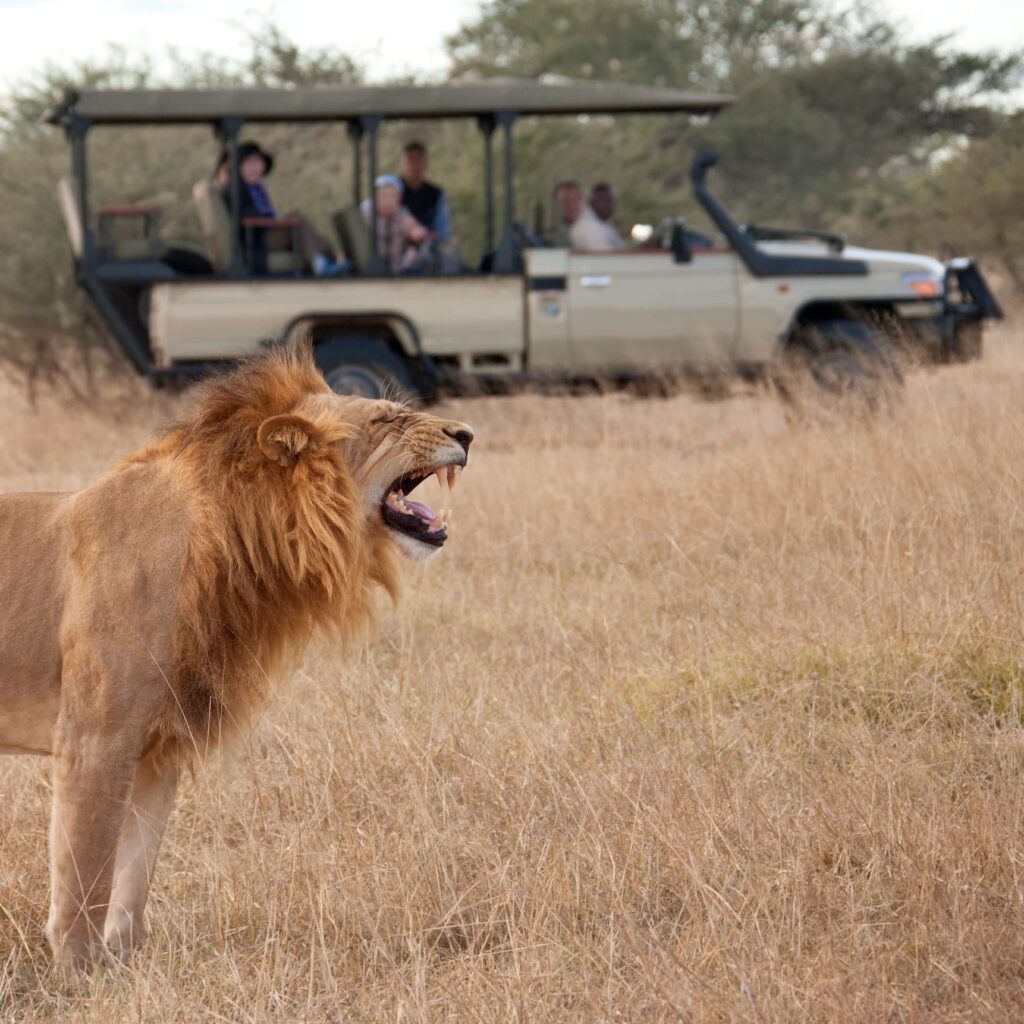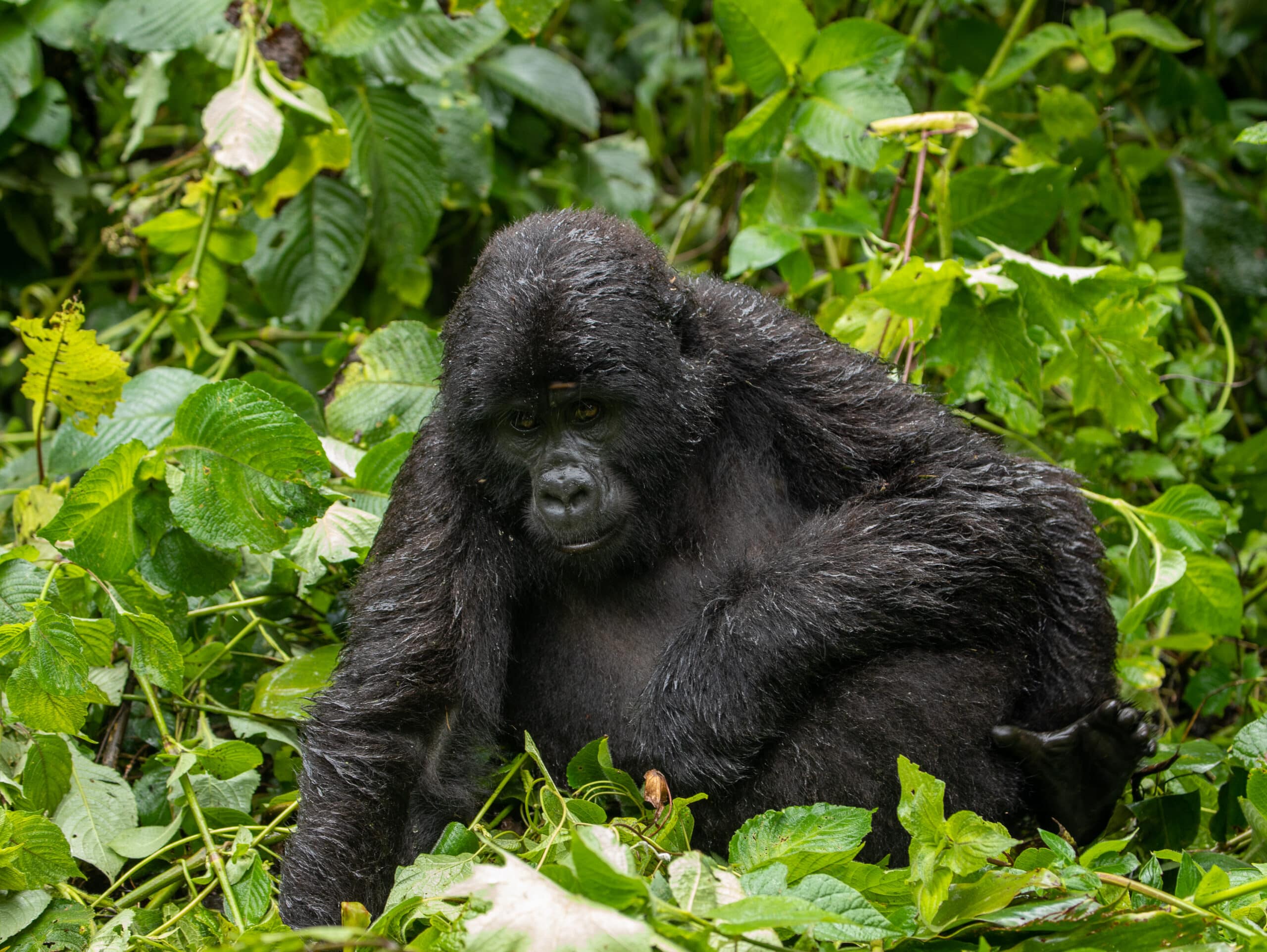“I’ll never forget the time a lioness from the Marsh Pride strolled past our open vehicle in the Masai Mara. She glanced at us once, gave the kind of look you’d give a mildly interesting billboard, and kept walking. My heart was pounding, hers clearly wasn’t.”
If you’ve ever been on a game drive in Africa, you know that surreal moment… The answer to the common question of why lions don’t attack safari vehicles is a fascinating mix of instinct, behavioral conditioning, and predator psychology.
At Ikigai Expedition, our Pathfinders have witnessed this hundreds of times. Let’s break down the science behind why lions don’t attack safari vehicles and the rare but critical exceptions to the rule.
1. The Vehicle is a Single, Uninteresting “Beast”
To a lion, a Toyota Land Cruiser isn’t a metal box filled with tasty snacks. It’s perceived as a single, large entity.
- Shape and Size: The vehicle’s silhouette doesn’t resemble any of their natural prey. It’s large, non-threatening in its movement, and doesn’t smell like food. Lions have learned to categorize it as something not worth their energy, much like they would a termite mound or a particularly large boulder.
- No Trigger: A lion’s hunting instinct is triggered by the sight and sound of individual, vulnerable prey. As long as everyone stays inside the vehicle, maintaining its solid shape, that trigger is never pulled. This is a key reason why open safari jeeps are safe when protocols are followed.
2. Humans Are Danger, Not Dinner
Lions and humans have a long, complicated history. For millennia, we have been competitors. This ancestral memory means lions are hardwired to be wary of us.
- Learned Aversion: Lions have learned that engaging with humans is a high-risk, low-reward activity. According to conservation bodies like the African Wildlife Foundation, human-wildlife conflict is a major threat to lion populations, reinforcing their instinct to avoid us when possible. We are unpredictable and often fight back.
- Not Natural Prey: We don’t fit the profile of their typical meal (like a buffalo or zebra). Hunting humans is an unnatural, last-resort behavior, not a preference.
3. Habituation: The Power of Being Boring
In high-traffic safari destinations like the Serengeti or Kruger National Park, lions see vehicles every single day. This constant, peaceful exposure leads to a behavioral process called habituation.
- What is Habituation? It’s a form of learning where an animal gradually stops responding to a repeated stimulus that has proven to be harmless. In these parks, lions may see over 100 vehicles a day.
- Predictable and Harmless: The vehicles always behave the same way: they approach slowly, keep a respectful distance, and make predictable, low-rumbling sounds. This predictable lion behavior around cars teaches them that vehicles are a normal part of their environment. Ultimately, this learned indifference is a major reason why lions ignore safari vehicles in popular parks
4. The ‘Human Factor’: Expert Guides Ensure Safari Vehicle Safety
A calm lion encounter is not an accident; it’s the result of professional training. Your guide (or Pathfinder, as we call them) is actively managing the situation to ensure safety.
- Reading the Language: They are trained to read subtle stress signals in a lion’s body language: a flicking tail, a flattened ear, a low growl and will back off long before the animal feels threatened.
- Strict Protocols: Professional guides follow a strict code of conduct: never corner an animal, never get between a mother and her cubs, avoid sudden movements or loud noises, and always give the animals the right of way. This professionalism is the bedrock of safari vehicle safety.
A Word from Our Pathfinder
“I’ve spent over 15 years guiding in the Masai Mara,” says David K., a Head Pathfinder at Ikigai Expedition. “The single most important rule is respect. A lion doesn’t see our vehicle as a threat because we never give it a reason to. No sudden revving, no chasing, no cornering. We are calm, predictable observers. We are part of the landscape. The moment you break that trust, you change the entire dynamic.”

5. The Energy Calculus: Apex Predators Avoid Risk
Life in the wild is a constant cost-benefit analysis. For a lion, an injury can be a death sentence. A broken tooth or a gored leg can mean starvation.
- High Risk, No Reward: Attacking a giant, noisy, metal “beast” is an enormous risk for an unknown reward. The potential for injury is high, and the object isn’t recognized as food.
- Conserving Energy: Lions spend up to 20 hours a day resting to conserve energy for the hunt. Wasting that precious energy on a pointless fight with a Land Cruiser is simply not in their survival playbook.
Myths About Lion Aggression and Safari Vehicles
- Myth: Lions are constantly prowling, ready to attack anything that moves.
- Fact: Lions are masters of energy conservation. They can spend up to 20 hours a day resting or sleeping. They hunt when hungry or when an opportunity presents a high chance of success, often at dawn, dusk, or night. They will ignore most animals including safari vehicles if they are not in hunting mode.
Safari Etiquette: The Unwritten Rules for Safe Lion Encounters
Take away the vehicle, and the rules change entirely. On foot, you are no longer a single, large “beast.” You are an individual, and lions will perceive you very differently. Whether in a vehicle or on foot, adhering to strict etiquette is paramount for your safety and the well-being of the wildlife.
Vehicle Safety Rules
- Stay Seated, Always: Standing up breaks the vehicle’s silhouette and makes you an individual target.
- Keep Arms and Cameras Inside: Don’t dangle anything over the side.
- Voice Control: Speak in low, calm tones. Loud noises can startle or stress wildlife.
- No Sudden Movements: Avoid quick, jerky motions.
- Trust Your Guide: They can read animal behavior you can’t. If they say it’s time to move on, it’s time.
Walking Safari Safety
- Single File: Always walk in a single file line behind your armed ranger.
- Listen More, Talk Less: Your senses are your best defense.
- Follow Every Command: Your ranger’s instructions are non-negotiable for your safety.
Understanding Lion Behavior: What If…?
| Scenario | What It Means & What to Do |
| A lion stares intently at the vehicle? | This is usually simple curiosity. Remain calm and quiet. The lion is assessing, not threatening. Your guide will monitor the situation. |
| A lion approaches the vehicle? | Often, they are just using the vehicle’s shade or walking along a path. It’s not a sign of aggression. Do not make any sudden moves. Enjoy the moment. |
| You hear a low growl? | This is a clear warning sign. It means the lion feels you are too close, or it is protecting a kill or cubs nearby. Your guide will immediately and slowly back the vehicle away. |
Quick Takeaways
- Lions perceive safari vehicles as a single, large, non-prey object.
- An ancestral wariness of humans means lions prefer to avoid us.
- Habituation in popular parks makes vehicles a boring part of the landscape.
- Expert guides are crucial for maintaining a safe, respectful distance.
- Attacking a vehicle is a high-risk, low-reward action that lions instinctively avoid.
- Strict safari etiquette, both in vehicles and on foot, is essential for safe encounters.
- On foot, the dynamic shifts completely; respect and expert guidance are non-negotiable.
Final Word: Respect the King
Lions don’t attack safari vehicles because of a delicate balance maintained by their own survival instincts, learned behavior, and the principles of responsible tourism. It’s a privilege to witness them in their habitat, a truce we must honor with respect and understanding.
Ready to Experience the Wild?
Join Ikigai Expedition for a safari in the Masai Mara, Amboseli, or Serengeti, and witness Africa’s most iconic predator up close safely, sustainably, and soulfully.
Start your Safari for the Soul → Book Your Adventure Now







